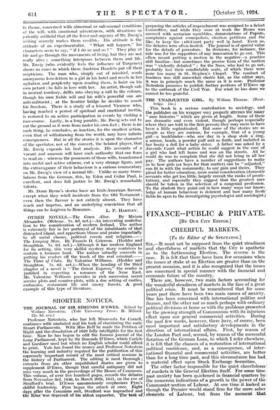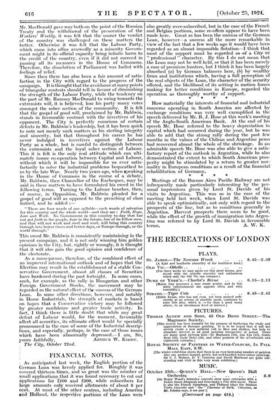FINANCE-PUBLIC & PRIVATE.
[By OUR CITY EDITOR.]
CHEERFUL MARKETS.
[To the Editor of the SPECTATOR.] must not be supposed from the quiet steadiness and cheerfahress of markets that the City is apathetic as to the forthcoming Election. The reverse is the ease. It_is felt that there have been few occasions when the issues at stake at an Election are greater than .on the present occasion, and it is also recognized that the issues are concerned in special manner with the financial and .economie future of the country.
There are, however, two main factors accounting for the wonderful steadiness of markets in the face of a great political crisis.- It must be remembered that for some years -past there have been two main causes of anxiety. One has been concerned with international politics and finance, and the other not so much perhaps with ordinary political divisions at home as with the problems presented by the growing strength of Communism with its injurious effect upon our general commercial activities. During the past few weeks, however, there have, of course, been most important and satisfactory developments in the direction of international affairs. First, by reason of the London Pact and, second, by reason of the successful flotation of the German Loan, to which I refer elsewhere, it is felt that the chances of a restoration of international political confidence, and, as a consequence, of inter- national financial and commercial activities, are better. than for a long time past, and this circumstance has had a material effect upon Stock Exchange Securities.
The other factor responsible for the quiet cheerfulness' Of markets is the General Election itself. For some time past -anxiety has-been quickened in financial quarters byi the numerous indications of a growth in the power of the Communist-section of Labour. At one time- it looked as though the Premier 'would stand firm for the more sober elements of 4Labour, but from the moment that Mr. MacDonald gave way both on the point of the Russian Treaty and the withdrawal of the prosecution of the .Workers' Weekly, it was felt that the sooner the verdict 'Of the country was challenged on these matters the better. Otherwise it was felt that the Labour Party, which came into office avowedly as a minority Govern- ment might in its official capacity bring infinite harm to the credit of the country, even if it did not succeed in _passing all its measures in the House of Commons. Therefore, the dissolution of Parliament was hailed with -feelings of relief. Since then there has also been a fair amount of satis- faction in the City with regard to the progress of the campaign. It is thought that the avoidance at many points of triangular contests should tell in favour of diminishing the strength of the Labour Party, while the tendency on the part of Mr. Ramsay MacDonald to swing towards the extremists will, it is believed, lose his party many votes amongst the sober sectiOn of the community. It is felt that the gospel Of good will, proclaimed by Mr. Baldwin, stands in favourable contrast with the invectives of his opponent. The City is perfectly conscious of certain defects in Mr. Baldwm's leadership, but it has been quick to note not merely such matters as his sterling integrity and sincerity, but that throughout his career he has never indulged in invectives _ against the Labour Party as a whole, but is careful to distinguish between the extremists and the loyal sober section of Labour. This it is felt is the only real attitude 'which can ulti- mately insure co-operation- between Capital and Labour, without which it will be impossible for us ever satis: factorily to solve the industrial problems bequeathed to us by the late War. Nearly two years ago, when speaking in the House of Commons in the course of a debate, Mr. Baldwin, then Chancellor of the Exchequer, may be said in these matters to have formulated his creed in the following terms. Turning to the Labour benches, then; of course, in Opposition, Mr. Baldwin pleaded for a gospel of good will as opposed to the preaching of class hatred, and he added "There are four words of one syllable—each words of salvation for this country and the whole world—and they are : Faith, Hope, Love and Work. No Government in this country to-day that has not got faith in the people, hope in the future, love of its fellow-men, and that will not work and work and work, will bring this country through into better times and better days, or Europe through, or the world through."
This creed Mr. Baldwin is consistently maintaining in the present campaign, and it is not only winning him golden Opinions in the City, but, rightly or wrongly, it is thought that it will also gain the good opinion and confidence of the electorate.
As a consequence, therefore, of the combined effect of an improved international outlook and of hopes that the Election may result in the establishment of a stable Con- servative Government, almost all classes of Securities have hardened during the past fortnight. In some cases, such, for example, as the rally in Hungarian and other Foreign Government Stocks, the movement may be fegarded as the natural effect of the success of the German Loan. In some other directions, however, and notably in Home Industrials, the strength of markets is based on hopes that a Conservative victory may be followed by greater confidence and greater trade activity. In fact, I think there is little doubt that while any great defeat of Labour would, for the moment, favourably affect all securities, its ultimate effect would be specially pronounced in the case of some of the Industrial descrip- tions, and especially, perhaps, in the case of those issues which have been abnormally depressed.—I am, Sir,



























































 Previous page
Previous page